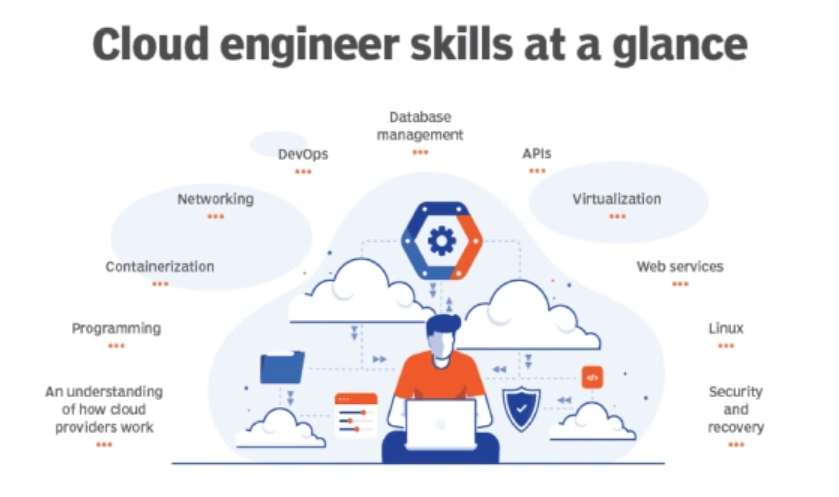Cloud computing has become the backbone of modern digital infrastructure, revolutionizing business operations. As organizations rapidly adopt cloud technologies, there is an increasing demand for skilled cloud professionals.
Whether you are curious about cloud computing, looking for cloud computing courses, or an enthusiastic tech professional, this quick cloud engineer roadmap blog covers everything you need to know about cloud engineering in 2025. Let’s learn together with WeCloudData!
What is a Cloud Engineer?
A Cloud Engineer is responsible for designing, deploying, and managing cloud-based systems and services. They guarantee that cloud infrastructures meet the demands of modern businesses by being scalable, secure, and effective. Cloud engineers work with cloud platforms like AWS (Amazon Web Services), Microsoft Azure, and Google Cloud Platform (GCP) to ensure seamless cloud infrastructure operations. WeCloudData offers beginner-friendly courses on AWS, GCP, and Microsoft Azure. To learn more, follow this link.
What Does a Cloud Engineer Do?
The first essential question in cloud engineer roadmap: what do Cloud Engineering jobs work with? Cloud Specialists work on a range of projects for their clients or companies. They develop and optimize individual cloud-based apps and communicate regularly with company representatives to ensure that programs and solutions consistently meet their needs.
Key Responsibilities of a Cloud Engineer
Cloud engineers are at the heart of the organization’s cloud environment. The specific responsibilities can include:
- Designing Cloud Solutions: Designing and implementing cloud architecture that meets business needs and enables safe data access and communication for all network users.
- Collaboration: Working collaboratively with fellow engineers and other team members to create and maintain applications.
- Network Management: Managing cloud networking, storage, and security
- Security Management: Ensuring compliance with cloud security best practices
- Monitoring and Optimization: Monitoring performance and optimizing cloud costs
- Automating Deployment: Automating cloud deployments using relevant tools
- Staying up-to-date on any new developments in cloud applications.
Essential Skills for Cloud Engineers
All cloud engineers, regardless of their specific roles, need to be skilled in these areas;
Programming Languages
Proficiency in programming languages is essential for developing and managing cloud-based applications. Key languages used by cloud engineers include:
- Python: Widely used for scripting and automation.
- Java: Commonly used in enterprise-level applications.
- SQL: Vital for database management and data manipulation.
WeCloudData offers mentor-guided coursed on Python (beginner to advanced) and SQL. To learn more, follow the link.
Cloud Service Providers (CSPs)
CloudOps Engineers need to be familiar with at least one of the major cloud service providers, whether it’s AWS, Google Cloud Platform, or Azure, and study how different CSPs assist in providing comprehensive user capabilities such as database, computing, storage, and migration.
- Amazon Web Services (AWS): Offers a vast array of services and is widely adopted across industries.
- Microsoft Azure: Known for seamless integration with Microsoft products.
- Google Cloud Platform (GCP): known for data analytics and machine learning services.
Networking and Security
Security is a top priority in cloud computing. A career in cloud computing requires a solid grasp of networking concepts and security practices: They need to;
- Virtual Private Cloud (VPC): Understand how to create isolated networks within the cloud.
- Identity and Access Management (IAM): Manage user permissions and access controls.
- Encryption: Implement data protection measures whether data is stored or being transferred.
DevOps and Automation
These are the advanced-level skills a cloud engineer masters that progress their career. The skills set involve having command on;
- Continuous Integration/Continuous Deployment (CI/CD): Automate the software release process.
- Infrastructure as Code (IaC): To manage infrastructure using tools like Terraform and AWS CloudFormation
- Containerization: Deploy cloud applications in containers using Docker and orchestrate with Kubernetes.
Data Management and Analytics
Data management and analytics are important for handling and analyzing data as they are the center of many cloud applications. At some phase in cloud application development, the cloud engineer works with databases and is expected to learn business intelligence tools.
- Databases: databases include relational (MySQL, PostgreSQL) and NoSQL (MongoDB, DynamoDB) databases.
- Data Warehousing: For large-scale data analysis, cloud engineers use services like Amazon Redshift and Google BigQuery
- Business Intelligence Tools: Use tools like Tableau and Power BI for data visualization.
Certifications to Validate Your Skills
Earning certifications can enhance professional credibility. The top cloud engineer certifications include;
- AWS Certified Solutions Architect – Associate: This AWS certificate validates ability to design distributed systems.
- Microsoft Certified: Azure Administrator Associate: This certificate demonstrates expertise in managing Azure resources.
- Google Associate Certification: It proves proficiency in deploying applications on GCP.

Pathway to Becoming a Cloud Engineer
A brief cloud engineer roadmap to follow is given below;
- Educational Foundation: A bachelor’s degree in Computer Science, IT, or similar fields offers a strong foundation and technical concept.
- Understanding Cloud Fundamentals: Learning the fundamental concepts of cloud computing like IaaS, PaaS, and SaaS is important to learn cloud computing.
- Programming Languages: Proficiency in languages such as Python, Java, or .NET is important.
- Gaining Practical Experience: Practical experience is a must to practice your concept by doing projects or internships.
- Certifications: Getting certification as mentioned above can leave a positive impact on your resume and skills.
- Continuous Learning: Staying updated with evolving technologies and tools in the cloud domain is the essential part of the cloud engineer roadmap.
Cloud Engineer Salary Trends in 2025
A career in cloud computing domain is a high-demand profession—the salary range vary from experience, organization, location and specialization. Here are recent trends in cloud engineer salary ;
- United States: Salary ranges from an average of USD 130,494 per year.
- Canada: Entry-level positions start at approximately CAD 70,000 annually, with senior roles reaching up to CAD 150,000.
Specializations, such as becoming a Cloud Security Engineer, can command higher salaries due to the critical nature of security in cloud computing.
Embracing the Future with Cloud Engineering
Cloud engineering is a rapidly growing field that plays a significant role in modern technology. The cloud provides secure and seamless data access while also opening doors to a successful career filled with in-demand opportunities. Candidates who wish to advance in the field have numerous opportunities.
Upskill with WeCloudData: Become a Cloud Engineer & Analytics Leader
Want to become a cloud data scientist, cloud engineer, or security architect? At WeCloudData, we help professionals like you break into the tech industry with career-focused Cloud Computing & Data Programs designed by industry experts.
Our Cloud Engineer Track delivers a comprehensive, hands-on approach to cloud engineering, equipping you with the skills to design, deploy, and manage secure, scalable, multi-cloud environments. The courses included in the cloud computing learning track include;
- Python Fundamentals
- Introduction to Linux
- Introduction to Docker
- AWS Fundamentals
- Azure Fundamentals
- GCP Fundamentals
Why This Program?
- End-to-End Cloud Mastery: From core principles to advanced architectures across AWS, Azure, and GCP.
- Enterprise-Grade Skills: Learn industry best practices for DevOps, resilience, and cost-optimized solutions.
- Real-World Readiness: Apply knowledge through hands-on projects and case studies mirroring modern IT challenges.
Who Should Enroll?
- Aspiring CloudOps Engineers and Architects
- DevOps & SRE Professionals expanding their cloud expertise
- Tech professionals transitioning to multi-cloud environments
Visit WeCloudData to start your journey into Cloud Computing!

